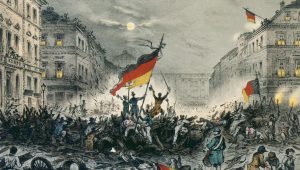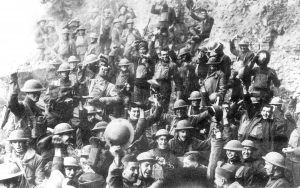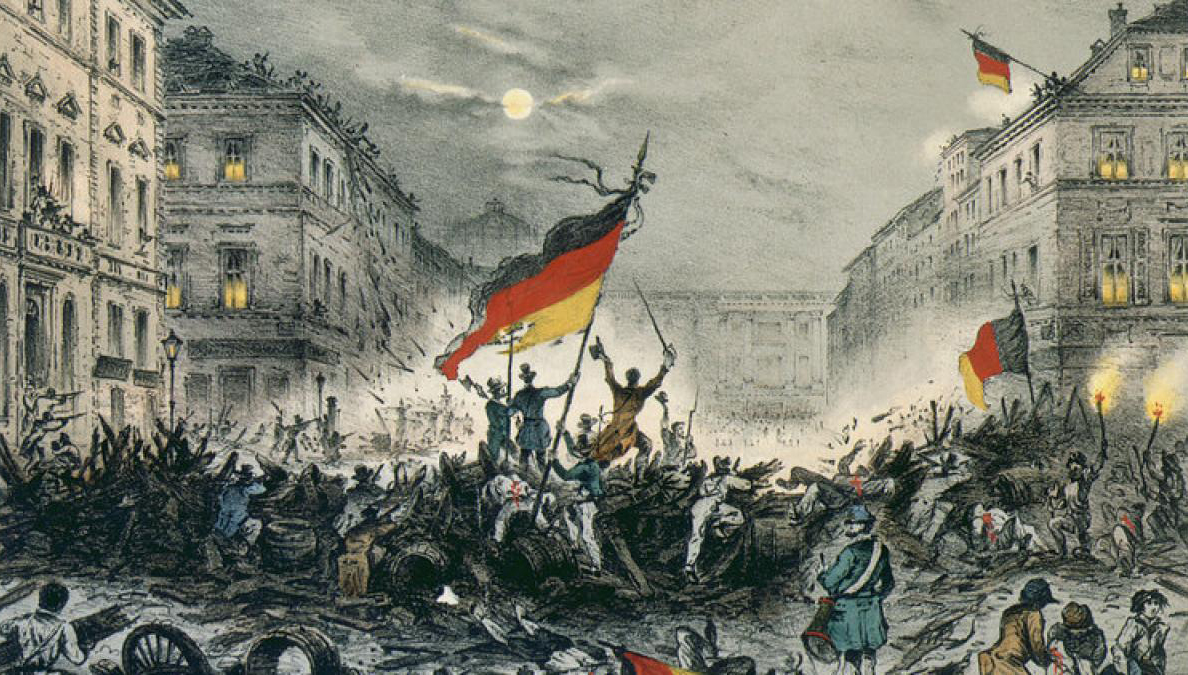To mark the first anniversary of Concerning History, we’re taking a look at some of the major historical moments being commemorated this year and providing some recommendations for further reading. There are plenty of other events out there worth marking, however, so if you have one you think we should have included, we invite you to scroll down to the comments and share it with us.
1848: A Year of Revolution

Heather Clancy
Even the most casual readers of history know Europe to be something of a global epicenter of revolution. That being said, when asked to call up iconic dates of revolution across world history, few think to place 1848 near the top of the list. Although often neglected by historians who elect instead to study the American War for Independence (1775-1783) or the French Revolution (1789-1799), the Revolutions of 1848 are just as rich and complex an area of study. In reality a loose collection of concurrent democratic liberal uprisings, the Revolutions of 1848 spread like wildfire across virtually all of Europe, including the Italian states (where the first ripple began), France, the German Confederation, and the Austrian Habsburg Empire; only Russia, Great Britain, Spain, and Scandinavia (short of Denmark) would emerge unscathed.
Although by and large a failed attempt to throw off the monarchical yoke, the Revolutions nonetheless resulted in several developments with far-reaching impact. In France, the Second Republic emerged and universal suffrage for men was declared. In Prussia and Sardinia, new constitutions withstood post-revolution suppression. A fresh wave of democratic German immigration to the United States in the years following also had the Revolutions to thank, as did the ranks these freshly-minted German-Americans would fill two decades later when civil war erupted in their new home. As we stand now, 170 years after the close of this particular year of revolution, I encourage each of our readers to take the opportunity to reflect on this underestimated but fascinating period of European history.
Recommended reading: Rapport, Mike. 1848: Year of Revolution. New York: Basic Books, 201; Roberts, Timothy Mason. Distant Revolutions: 1848 and the Challenge to American Exceptionalism. Charlottesville, VA: University of Virginia Press, 2009.
1918: First World War Armistice & Outbreak of the Spanish Flu
Bryan Caswell

The year 2018 marks the centennial of the armistice that ended fighting on the First World War’s Western Front, and 2018 will thus likely mark the last major year of the WWI centennial commemorations. Full disclosure: it was unexpectedly hard to write that first sentence, as my hands kept wanting to type something about “the end of the First World War.” The Armistice was certainly very important, and has become more so with hindsight; the bloodiest, muddiest front of the war was finally brought to a close with the Allies’ victory over German forces, and fighting would not resume in Europe. Allied armies began to demobilize, and as they returned home, they spread and fell victim to a deadly strain of influenza that would claim another 20-50 million lives and infect one third of the world’s population.
In recent years, however, historians have blown open the study of the Great War’s ongoing legacy. Most basically, an armistice does not actually conclude a war, and it would be more accurate to say that the First World War ended in 1920 with the signing of the Treaty of Versailles. In theaters other than Europe, fighting would continue for years as nations such as Greece, Italy, Turkey, and Arab forces fought to influence any possible territorial settlements and state formations. As we remember the Armistice of 1918, we must also remember that a large part of its remembered importance comes from a Eurocentric view of the history of the First World War.
Recommended reading: Macmillan, Margaret. Paris, 1919: Six Months that Changed the World. New York: Random House, 2003.
1968: The Year that Rocked the World

Kevin Lavery
Six score years after revolution rocked Europe in 1848, the world again seemed turned upside down by protests, riots, war, and assassinations. Years of tensions over issues ranging from racism and the Vietnam War to labor rights and imperialism boiled over into anger, rage, and an unyielding hunger for change. Here at Columbia, students broke into the president’s office and raided locked filing cabinets, discovering incriminating evidence of the university’s links to the Military-Industrial-Academic Complex and the Vietnam War. Grayson Kirk, the university president, was forced to resign shortly after.
But Columbia was merely the tip of the iceberg. Across the US, the assassination of Martin Luther King, Jr. provoked violent riots across the country. In France, massive strikes by students and workers forced Charles de Gaulle to briefly flee the country. Even countries beyond the Iron Curtain saw backlash against communist domination, especially in Czechoslovakia. Not unlike 1848, some of the protests prompted limited change, but the status quo proved too ingrained to be toppled by instantaneous action. It would also prove a turning point for the Left: the late Erik Hobsbawm described the year as the last gasp of the radical alliance between students and workers.
As the political climate of 2018 continues to rekindle America’s radical and progressive heritage, you can be sure to see references to 1968 reemerge as a cultural touchstone. We’ve seen it already this year in the memory battles over King and his personal brand of radicalism.
Recommended reading: Check out the Twitter accounts @TodayIn1968 for NPR’s day-by-day coverage of 1968, @1968CU for stories of campus unrest at Columbia, and @RFN_1968 for the year as depicted in film.
